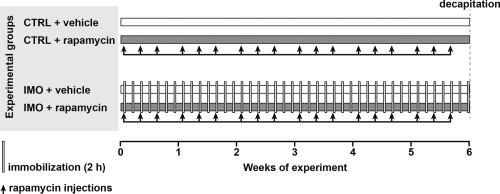当前位置:
X-MOL 学术
›
J. Neuroimmunol.
›
论文详情
Our official English website, www.x-mol.net, welcomes your feedback! (Note: you will need to create a separate account there.)
Effect of rapamycin on repeated immobilization stress-induced immune alterations in the rat spleen
Journal of Neuroimmunology ( IF 3.3 ) Pub Date : 2020-09-01 , DOI: 10.1016/j.jneuroim.2020.577309 Ivana Rokytová 1 , Boris Mravec 2 , Marcela Lauková 3 , Peter Vargovič 1
Journal of Neuroimmunology ( IF 3.3 ) Pub Date : 2020-09-01 , DOI: 10.1016/j.jneuroim.2020.577309 Ivana Rokytová 1 , Boris Mravec 2 , Marcela Lauková 3 , Peter Vargovič 1
Affiliation

|
Chronic stress modulates immune system functions via neuroendocrine pathways. Rapamycin inhibits activity of immune cells through the mTOR signaling pathway. We investigated the effect of rapamycin (15 mg/kg, 3-times/week) on neuroimmune-endocrine system in the spleen of rats exposed to 42 cycles of 2-h immobilization. Rapamycin enhanced the activity of hypothalamic-pituitary-adrenocortical axis induced by stress exposure, prevented stress-induced expression of natural killer cell markers while reversed stress-evoked decline of Th2 immune response markers. Overall, our findings suggest that rapamycin may act on immune functions not only directly by inhibiting of mTOR in immune cells but also indirectly via modulation of neuroendocrine system.
中文翻译:

雷帕霉素对反复固定应激诱导的大鼠脾免疫改变的影响
慢性压力通过神经内分泌途径调节免疫系统功能。雷帕霉素通过 mTOR 信号通路抑制免疫细胞的活性。我们研究了雷帕霉素(15 mg/kg,3 次/周)对暴露于 2 小时固定 42 个周期的大鼠脾脏神经免疫-内分泌系统的影响。雷帕霉素增强应激暴露诱导的下丘脑-垂体-肾上腺皮质轴的活性,阻止应激诱导的自然杀伤细胞标志物的表达,同时逆转应激引起的 Th2 免疫反应标志物的下降。总的来说,我们的研究结果表明,雷帕霉素不仅可以通过抑制免疫细胞中的 mTOR 直接作用于免疫功能,还可以通过调节神经内分泌系统间接作用于免疫功能。
更新日期:2020-09-01
中文翻译:

雷帕霉素对反复固定应激诱导的大鼠脾免疫改变的影响
慢性压力通过神经内分泌途径调节免疫系统功能。雷帕霉素通过 mTOR 信号通路抑制免疫细胞的活性。我们研究了雷帕霉素(15 mg/kg,3 次/周)对暴露于 2 小时固定 42 个周期的大鼠脾脏神经免疫-内分泌系统的影响。雷帕霉素增强应激暴露诱导的下丘脑-垂体-肾上腺皮质轴的活性,阻止应激诱导的自然杀伤细胞标志物的表达,同时逆转应激引起的 Th2 免疫反应标志物的下降。总的来说,我们的研究结果表明,雷帕霉素不仅可以通过抑制免疫细胞中的 mTOR 直接作用于免疫功能,还可以通过调节神经内分泌系统间接作用于免疫功能。



























 京公网安备 11010802027423号
京公网安备 11010802027423号